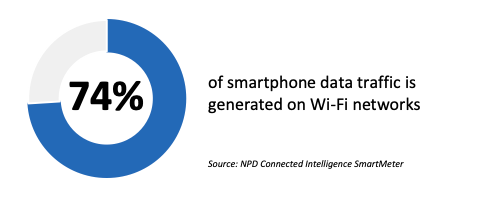
Verizon launches Yahoo Mobile spin-off
Verizon has launched a new spin-off service based on its Yahoo brand. The new Yahoo Mobile service offers customers an affordable unlimited data plan service that comes with free mobile hotspot tethering (for one device/speed capped at 5Mbps) and Yahoo Mail Pro subscription at $39.99/month. Notably, Yahoo Mobile’s service and pricing structures are identical to its Visible digital MVNO service, which was launched almost two years ago. Both services run on Verizon’s 4G LTE network, though Visible customers are offered additional savings options such as $15 entry discount or monthly service fee discounts for multi-line accounts.
The NPD Take:
- Verizon will be dealing with a lot of criticism for launching a new mobile offering based on a consumer tech brand that’s been on the decline. However, the carrier has been facing a lot of price pressure from rivals and it’s not been as successful as rivals like T-Mobile in attracting younger generation customers. The Visible spin-off has been relatively successful from a brand diversification standpoint, but according to a recent NPD survey, less than 3% of U.S. cellphone owners were aware of the Visible service as of the end of 2H 2019. Launching another spin-off brand with much higher awareness rates and doing it based on the already available Visible back-bone may not be a bad idea after all.
- Yahoo Mobile may not be offering as many incentives as Visible does, but the unlimited plan price point is still quite competitive compared to parent Verizon’s comparable rate plan priced at $65/month. Verizon has long been leading the market in consumer perception towards network-related attributes such as coverage, speed, and service reliability, and Yahoo Mobile customers will essentially be getting the same network quality (minus retail support) with almost a 40% discount.
Carriers join the coronavirus fight
As the coronavirus pandemic threat continues to grow, U.S. fixed and mobile service providers have stepped in to assist their customers during these difficult times. AT&T and Comcast were the first providers to jump in, with AT&T announcing that it is the suspending broadband data caps for home internet users and Comcast boosting the internet speeds of customers on low-cost plans beginning last Thursday. A day later the FCC launched a new initiative dubbed the “Keep Americans Connected Pledge” that asks providers to waive late fees and open private access Wi-Fi points to the general public to ensure customers stay connected. On the same day, T-Mobile announced that all T-Mobile and Metro customers on data bucket plans will be provided unlimited data for 60 days and all customers will be getting an additional 20GB mobile hotspot/tethering service on top of their current allotment.
The NPD Take:
- The entire globe is going through an extremely difficult turmoil that has never been experienced in recent decades. U.S. carriers voluntarily pitching in to assist their customers during these tough times is extremely important as citizens need robust connectivity more than ever.
- With telecommuting and online-education inevitably peeking, it is safe to assume that in-home Wi-Fi usage will hit record levels. According to the NPD Connected Intelligence SmartMeter, Wi-Fi traffic accounts for three-quarters of the total data traffic generated on smartphones, and this figure is poised to grow as more users stay home and connect their smartphones to the Internet via Wi-Fi. U.S. mobile service providers may not be experiencing too much pressure on their mobile networks as we ride through this storm.
Apple stores in China are back in business, but…
Apple previously closed down all retail operations in early February to fight the spreading of the various in China. The company then reopened 29 of its 42 locations in late February, and early last week it announced that 38 of its 42 retail outlets are now back in business. The joy lasted for only a couple days as Apple announced on Friday that it will be closing down all retail stores outside mainland China until March 27.
The NPD Take:
- The reopening of the Apple stores in China has meant a lot for Apple considering how critical the Chinese market from a volume growth standpoint. However, this upbeat news has now been greatly overshadowed by the store closures in the rest of the globe. The initial worry about the virus impacting the supply chains in China is slowly transitioning into a greater concern fueled by a demand crisis.
- 2020 should have been a pivotal year for Apple with the alleged debuts of the low-cost iPhone and 5G-powered new iPhone Pro models. However, there are already rumors about possible delays with both models as the OEM is (likely and rightfully) preparing itself for a possible supply/demand shock.